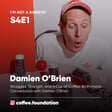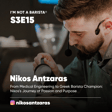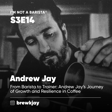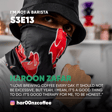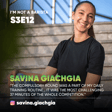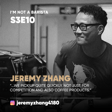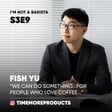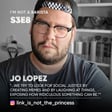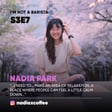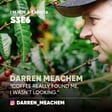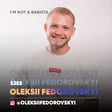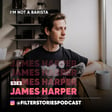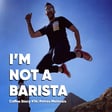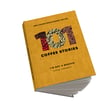Introduction and Podcast Goals
00:00:07
Speaker
Welcome to the I'm Not a Barista podcast. We're here to talk about all things coffee from industry careers, brewing tips, community support, and more with some really incredible people who love coffee as much as you do. We hope their stories inspire you because humanity runs on coffee and together we can empower all the people behind every cup. Welcome to I'm Not a Barista podcast.
Meet Levent: Engineer Turned Coffee Enthusiast
00:00:37
Speaker
Thank you for inviting. How are you today? Yeah, I'm fine. Thank you. How are you, Mickey? Very good here. Thank you so much. So first, please let us know who you are.
00:00:50
Speaker
Okay. So, uh, long story, right? Yeah. Yeah. It's the most difficult question. And that's the one I typically ask to my guests. So I am Levent. I am from Turkey. I am a home barista and actually I am a full-time aeronautical engineer. So coffee is my hobby and I have been brewing coffee since 2010.
00:01:14
Speaker
So that's a brief summary of myself. I'm married and have a daughter, five years old.
Levent's Coffee Journey and Content Creation
00:01:21
Speaker
So she takes my time and she also likes coffee. Really? Five years old? Yeah, five years old, but she can drink coffee. Even she likes espresso. Well, I guess that's how you become a Turkish, right? That's part of who you are. Exactly.
00:01:41
Speaker
So it's interesting, when I write to bio, you say you're an engineer. Tell us about your real job.
00:01:49
Speaker
Yeah, sure. I mean, I graduated in 2006 as an aeronautical engineer. Then I got my master's degree. Then I started PhD. So I mean, I was a tree engineer at that time. Actually, still my title is senior engineer. So I am working in a global company. First five, six years I worked in aviation industry.
00:02:12
Speaker
I worked in design of aircraft engines, the jet engines, then now I am in the power industry. So that's why, you know, I like the engineering side of the equipment. I like the equipment to be especially the hand grinders. So I have a
00:02:29
Speaker
different look as I am an engineer. So I've been an engineer for the last 16 years. So it's a aircraft engines, aircraft design. Also, I had some leadership roles in a global company. As I mentioned, coffee is my hobby, but it takes a lot of time, I guess.
00:02:48
Speaker
Yeah, must be, right? You're a blogger, you have your own podcast, you're also a YouTuber, you create video content, and you have your Instagram account. So there are a lot of things going on with the coffee in your life. So how is your coffee journey going so far since 2010? Oh, uh.
00:03:09
Speaker
You know, everyone likes coffee, especially when working. So it all started like that. So before we just have the instant coffee and the Turkish coffee in Turkey. So it started like that. I cannot say I was a big fan of coffee at that time.
00:03:25
Speaker
But in 2010, during a business trip, I bought a Herio V60, a plastic one. Then in 2011, I bought another one, a glass one. So they are still in service.
Exploring the Depths of Specialty Coffee
00:03:38
Speaker
Plastic one is a real survivor. You need to see the picture of it. It has been in service for the last 12 years.
00:03:46
Speaker
So after 2013 Specialty Coffee, at that time it was called Turtwave Coffee, actually. It was a more popular name at that time than Specialty Coffee. I started to find Specialty Coffee roasters. Then I learned what the coffee is, what Specialty Coffee is.
00:04:07
Speaker
And I fell in love with coffee and I like to try different coffees from different roasters than it was a whole new world for me. Then, you know, now we are in 2022 and I have been trying maybe at least 30, 40 different coffees in a month.
00:04:26
Speaker
and maybe 300-400 coffees in a year. So it all started as most of us, like instant coffee, then now it grew into all the world of the nice specialty coffee, Mickey.
00:04:40
Speaker
That's a lot of coffee you test every month. Yes. So compare with your food time career. Is coffee more complicated or your engineering career is more? Oh, it's a difficult question. Coffee is complicated. I mean, it's, there are many chemical reactions and such, but I am not the Genetin Gagni.
00:05:03
Speaker
So I can tell you more about it. I mean, both has their own complexities. But as I earn the money from the engineering, I need to say it's more complex, Miki. But breathing coffee is also a complex journey. It takes a lot of time to read and learn, especially if you're a blogger or if you have a
00:05:25
Speaker
you know, aim to tell people what the coffee is, how to get the most out of it, then it becomes more complicated because you need to think about the materials, the design, and everything, how to use it. There is some physics behind it. You need to know what you are doing. It all depends on the equipment you have. For example, people say, you know, I use 1 to 17 coffee to water ratio.
00:05:51
Speaker
That's okay, but you can just use it if you have a very good grinder, very good particle size distribution. Otherwise, you should not use 117. Maybe you can use the one to 15. So that's the physics behind it. That's the complexity behind it. So if you are really a good coffee lover, you read
Creating Coffee Content and Community Engagement
00:06:13
Speaker
and learn. It's not rocket science.
00:06:15
Speaker
but you need to learn the fundamentals carefully, then all the cups becomes a joy for you. Of course. As I remember, you are not the only engineers in the coffee industry that I interviewed. And also there are some big names, such as Jonathan, also engineer from physics, right? Yes. I want to know, you guys are a special part of industry. You're not barista. You don't work in the coffee industry. Somehow you're related. Yes. What do you think you guys wrote in the coffee industry?
00:06:45
Speaker
Because you're engineers, you evaluate coffee or think coffee in a different way than me and then the regular coffee lovers. Yeah, the thing is, I think it's about what coffee is for you and how the hobby is evaluated. I mean, with the start of the pandemic, I started to work from home and sharing coffee content from my personal Instagram account.
00:07:12
Speaker
After some time, my wife said, I mean, this can no longer go like that. You need to create a new account. I don't want my daughter to be seen by others with the coffee pictures and myself. You need to separate your personal account with the coffee account. So it all started like that.
00:07:32
Speaker
Then I started to share the coffee content equipment reviews. Then people liked it. Seems like there was a need from the local coffee community to share such experience because most of the coffee experience is shared by the professionals.
00:07:47
Speaker
But when it is shared by the home baristas that are doing this voluntarily, like yourself, it takes more attention. And people really want to hear the real user coffee experience. After some time, I met with a friend, Ismail. He is also creating coffee content on Instagram, PeppuCafe.
00:08:06
Speaker
And then we thought that, I mean, we need to start some conversations about coffee. It's like, you know, there should be some content voluntarily, nonprofit, and need to tell people what the coffee is. And we need to be a bridge between the
00:08:24
Speaker
You know, coffee professionals and the home baristas, that's how we started the CAHEM, our talk shows. I mean, our aim is just to increase the awareness for the good coffee and to show how to get the most out of it and to show people the real user experiences and guide them while choosing a coffee equipment because they are not cheap.
00:08:47
Speaker
Most of them are expensive. It's like, you know, we just have a vision to tell people the real experiences, real user experiences by the real home baristas, not from the coffee professionals. That was our aim. It's how we started the Kahumasase live talk show.
00:09:05
Speaker
And it has been, I think, 83 episodes up to now, Miki.
Specialty Coffee in Turkey: Growth and Challenges
00:09:10
Speaker
So we have been having for the last 83 weeks. That's how it started. It's our hobby. We just want to listen local coffee communities and try to respond to their needs. That's awesome. Since you talk about local coffee community, tell us more about Turkish coffee community. What do we know and what we don't know about it? Oh, I mean,
00:09:34
Speaker
There is a lot of interest in coffee lately in Turkey, like most parts of the world. Within the last two, three years, the specialty coffee industry grew and many people now asking questions about the coffee and they are demanding roasters to bring high quality coffees, high score coffees. They also demand for better coffee equipment. For example, like two, three years ago,
00:10:00
Speaker
There were very limited hand grinders in Turkey. It's like it all started with the commandante, then we had a distributor for Timemore, but there was no more. But within the last two years, we had all the coffee grinders now in the market.
00:10:17
Speaker
Currently we have all the coffee equipment in Turkey and we have great distributors. So I see a high demand both in the coffee side and the equipment side. And I also see the numbers of roasters are also increasing.
00:10:35
Speaker
This is good and bad. The good side is you can experience better coffees or several coffees from the several roasters and compare how they do. Some may roast darker, some may lighter. You can experience that one. It's also bad. Why? Because they are not all well educated.
00:11:01
Speaker
Because in order to become a good roaster, you need to educate yourself well. So with the high demand on coffee, there are also many roasters that try to sell cheaper beans to the people. So I think that's the balance between the demand and the industry.
00:11:23
Speaker
That is true. You're talking about there are more roasters in recent years, which means their market amount is growing, growing. Yes. What do you think is that? What happens? Oh, actually, you know, Turkey, I mean, we typically drink tea in Turkey and we also have a great culture of coffee, but it's mostly Turkish coffee.
00:11:46
Speaker
So it's not the best coffee in the world right now, because, you know, in the origins of the Turkish coffee, people were using coffees from Yemen. So very high quality coffees. But after the, you know, during the war times in Turkey, so there was a shortage on coffee, then we exported coffee from Brazil, the Rio Minas coffees. You know, they are not the best quality coffees. And now when we show people
00:12:16
Speaker
that they can't breathe coffee from the other origins, other countries, they realized that the test is really different because typically they tend to buy their coffees from the chain markets, the bigger coffee shops, and their roasting style. It's not like to highlight the best of the coffee. They are mostly on the darker side because they need to be consistent on their products. That's how they could do it.
00:12:46
Speaker
With the specialty coffee roasters, people also connected to them. It's easier to communicate. I mean, you cannot communicate with a big coffee chain. You cannot find anyone to talk with you except the barista. But with the roasters, small roasters, you can talk everything about coffee. So it's how it started. People realize that when they ask questions,
00:13:09
Speaker
they get very nice answers. Then they realized that different coffees have different testes. Like when they breath Kenya, they say, oh, it's a very nice acidity here. When they breath a natural process Ethiopia, they say, lots of free testes here. So when they saw this, they started to dig into special coffee world and they ask for more and more. I think that's the demand.
00:13:35
Speaker
So actually it's a good sign more people are into specialty coffee and roasters. But I also know that in this year or since last year, Turkey has been experiencing a huge economic issue, high inflation. How does that influence the market? Let's say your friends who buy coffee or your roaster friends import a coffee, how's going there?
00:14:01
Speaker
Oh, I mean, it's a very big issue here in Turkey. I have many friends that, I mean, stop drinking specialty coffee. They are looking for cheaper alternatives. Some started to sell their equipment to get some money. It's really currently expensive compared to the economical power in Turkey. Specialty coffee, as you know, it's not that cheap.
00:14:25
Speaker
And it's more expensive. And in Turkey, when you import the coffees, there are a lot of costs besides the green coffee beans. The analysis, you know, the taxes and transportation, it makes it very expensive. So it's not easy to access good green coffee from Turkey, like the rosters in Europe. I mean, they can just order a coffee and
00:14:51
Speaker
they get the coffee the next day at their door, right? But here it's not that easy. For example, just with numbers. If a roaster in Europe wants to buy a good coffee, they can buy it at $15 per kilogram, for example. But the same coffee in Turkey should be around more than $20, maybe $20, $22, $23 for the same coffee. If they bring that coffee,
00:15:18
Speaker
They need to sell at higher prices. And due to the economical power here, they cannot buy it. So that's why they try to find the best coffee compared to the price, but they also need to compete with the world. Otherwise, we have very good roasters here. Green coffee selection is very critical in Turkey right now.
Supporting Local Coffee Communities
00:15:43
Speaker
real issue, isn't it? Let's say the market is growing, people are more interested in good quantity coffee, but then as a country, let's say Turkey import coffee, green coffee from somewhere and you have to pay double price. Let's say you compare with US and it's very harmful to the market because you have to pay action.
00:16:07
Speaker
Do you see a trend Turkish coffee lover will purchase coffee directly from Europe or because local roasters they are more expensive?
00:16:16
Speaker
Sometimes, yes, sometimes not. So, I mean, there are people that has money and that does not have money. So, as in every country. So, there are some people that always wants to get the best. They use the European roasters or the roasters from US. They buy it from there. They don't care. And some wants to try good coffee.
00:16:41
Speaker
or different rosters in europe so they create some budget to buy it so there's also a trend like that but currently people stopped
00:16:53
Speaker
I will not say it's stopped, but the reduced orders from the European rosters. That's what I feel and hear from my friends, because with the increased rates, it's more and more expensive right now. But sometimes they also complain about the high prices in the local market, and as a reaction, they just order from European
00:17:17
Speaker
As I mentioned, most of the people now just try to get the discounted coffees or try to catch a good discount and get like, for example, instead of 250 grams, 1 kilogram of coffee at discounted price and drink it during the month. So that's the trend right now.
00:17:38
Speaker
Yeah, I see. As I remember, two years ago, just before, just after the pandemic started, and the Air Press asked, I'm not British then, some coffee friends started a Burial Home campaign. So we offer a lot of discounts from roasters all over the world and help a lot of people in that time, actually. So what do you think if you guys have some similar thing, local, help roasters, help local coffee community?
Levent's Brewing Preferences and Equipment Insights
00:18:05
Speaker
In this case, roaster probably will earn less because they offer a discount, but then more people are willing to buy it because they can afford it instead of stop drinking, especially the coffee completely. Are you guys doing something like that?
00:18:20
Speaker
Yeah, we always do that. I mean, there are not many coffee content creators in Turkey. And as I said, we have been doing this for the last 83 weeks. So we met with most of the rosters and most of the distributors in Turkey. So they know us. We know them. We have a good relationship.
00:18:38
Speaker
And sometimes when they have neither coffees, we just say, OK, do you want to make a discount for us for the local coffee community? And most of the time they say yes, and we can get 20 percent, 30 percent off for the local community. And we just announced it from our social media. We also have the Turkish coffee's largest forum. It's Kavalard.net. We own it with my friend. We also announced it there. I also worked
00:19:05
Speaker
with many wholesale activity for the equipment size for example for the kafalat robot kino time more at all other equipment i just go to the distributors and say there are some people wants to buy this equipment but you need to give us some discount so i will get you at least ten fifteen people to buy it.
00:19:26
Speaker
So that's how we work. I don't earn anything. So I don't get the equipment for free. But it's just as I mentioned at first, it's a bridge between the home baristas and the distributors. So it's like a women's situation here. We get the equipment at reduced price and distributor sale their equipment.
00:19:47
Speaker
Everyone is happy. That's one of the purpose. That's very meaningful, I believe, because you're really helping both sides of the coffee industry. People who need coffee, need gears, but find it difficult to buy because of the economic situation. Also, you help the retailers, sellers to sell their products too. So I think it's a win-win. Exactly. Because they also win. They get cash.
00:20:14
Speaker
when they make the sales, so they can buy green coffees. It supports also the small businesses and the small roasters. They may get reduced margins, but they sell the same coffee, maybe in a week they sell the same amount that they could sell in a month. So it really helps both sides.
00:20:38
Speaker
Exactly. So we talk about a Turkish coffee community, what's happening right there and how you are helping them. Let's talk about coffee, coffee itself. What is a fairy coffee? It's another difficult question. So yeah, I tried mini coffees and I really like naturally processed Ethiopian coffees.
00:21:02
Speaker
They are amazing, but it should be clean and not that intense. So in Arabic coffees and experimental methods,
00:21:11
Speaker
Yeah, I also like it, but, you know, sometimes there are more fermented flavors, fennels in the coffee. That's what I don't like. I also like the washed coffees. They are bright and very clean. Typically, I try to test and experience all the coffees, but my favorite is, I think, natural processed Ethiopian coffees and also Geisha. So that's for sure.
00:21:39
Speaker
Good. So next question moves to, what's your favorite brute method?
00:21:44
Speaker
Oh, it's V60. V60. So yeah, I have been using it for the last 12 years. Maybe not only V60, but it's cone drippers. Either V60, Crystal Eye, or Kona, or you name it. I like to use cone drippers. I like to bring my coffee in cone drippers. And my second favorite is for sure AeroPress. And I also like manual espresso gear.
00:22:11
Speaker
Of course, you are a two reviewers. You have so many gears and grinders. And when we watch a YouTube video, we can find a lot of great content. And you talk about the gears, the pros and cons from your engineering perspective. V60 is your favorite. I know in a market, there are so many kinds of drapers, right? Different shapes, geometry, and inside different patterns. Which one do you think is the best based on your engineering background? Let's talk about coffee science.
00:22:41
Speaker
Okay. So, I mean, what I always say is, it's not the equipment who breathe the coffee, it's you. So, you can get the similar test with every equipment. So, it's the same thing. You need to know the fundamentals, you need to know how to breathe the coffee. For example, Timer Crystal Eye, I mean, it gives you faster flow.
00:23:05
Speaker
but and lets you to get finer grounds. But in Herio, you can also compensate it.
00:23:13
Speaker
Or while using Calita, you need to know the difference between a flat-bottom dripper and a cone-shaped dripper. And you need to control the agitation and the amount of water you pour. So it's all about what you like and whether you know how to breathe coffee or not. I just see it as a balance between physics and what you like. And I try to be very careful on this topic, Miki.
00:23:42
Speaker
So we don't need to have engineering degree, right? To prepare coffee. Exactly. When you don't know what we like first. Yeah. So imagine you're a big lover of coffee grinders, hand grinders. Yes. Tell us more about your hobby. Why do you think hand grinding is such an interesting topic?
00:24:03
Speaker
Yeah, so it's not about only being an engineer, but I think I love all the manual coffee gear, not only hand grinders, but my favorite topic is hand grinders. I think up to now, I reviewed all time more series, Commandante, Kinu, Normcore, Cafflano, Easy Presso, Edzinger, Herio, so you name it. Best thing about hand grinders is you can carry them with you.
00:24:30
Speaker
Typically, if you need a grinder that will be good at espresso and prover and it's electric, it's really expensive. You cannot find a good electric grinder that can grind for both espresso and prover. But with the hand grinders, it's easy. It takes some time to grind. That's okay. But they are very simple machines.
00:24:54
Speaker
It's very easy to grind the coffee, it's very easy to clean, you cannot get them damaged easily, you can't carry it everywhere. For example, if you have an espresso machine at home and also like to brew pour over, which electric grinder will you choose?
00:25:12
Speaker
It's a very difficult question and there's no one answer that will give you the same result as a hand grinder. So I think hand grinders are the most affordable options for a home barista for both Pro or an Espresso.
00:25:30
Speaker
And they are easy to access. For example, if you also see the trend, there are many brands right now and there are many different hand grinders in the market right now. So they are accessible, they are cheaper, it can give you what you want easily. I think that's the best thing about the head grinders for me.
Innovations in Coffee Grinders
00:25:51
Speaker
And in means of design,
00:25:53
Speaker
So, I mean, they all have different design and all hand grinders have their pros and cons. Some are easier to grind, better ergonomics, some are more difficult, some produces more fines, some are better for prover, some has good range for espresso, some don't, some are expensive, some are cheaper. There is a hand grinder for everyone in the market. So that's what I think.
00:26:22
Speaker
Thanks. Have you ever considered one day you will design your own grinder since you're into this topic so much? Yeah, it's very difficult to produce something, design and produce something. You know it, right? The momentum. As you say, that's not rocket science, so it should be easy.
00:26:42
Speaker
Yeah, coffee is not a rocket science, designing a coffee grinder. Okay, it may not be a rocket science, but it's complicated. You need to work on the bird design. So it's the heart of the grinder.
00:26:58
Speaker
As we all know, why Commandante is popular? Because the bird is solid and it gives consistent results. Otherwise, its ergonomics is not the best, its setting dial is not the best, but the grinding mechanism is great.
00:27:13
Speaker
Maybe one day I may do it, but it's really difficult to get funded. So you need to start a campaign on Kickstarter, most probably. Otherwise, it's really very, very expensive. There are some local companies in Turkey that started good products, but they cannot go on producing it because you need to sell in good amounts.
00:27:39
Speaker
It's not important to design something good. You need to make it work and you need to show it in the real life. I don't think I will, I mean, produce my own, but maybe I can support others.
00:27:54
Speaker
Thank you. But don't worry about it, but about the crowdfunding, others, if you need help, always let us know because we are here to help. We have some experience in crowdfunding, Kickstarter, in Google. We also have some connection with manufacturers. So anything you ask, we can always, you know, we're always here to help.
00:28:11
Speaker
Thanks so much, Jackie. So I hope one day we can see your own Grindr with your own name. Next question, you mentioned that a few years ago you created your current Instagram account. In English, it causes aircraft coffee, right? Yeah. So you also think maybe it's not the best name.
00:28:35
Speaker
Let's say we have a time machine. You can go back right now. You have a chance to change that name. What would be the new name you want to give it to it?
00:28:43
Speaker
Oh, I didn't think about it. But as I mentioned, it's a Turkish name, and Teyare means aircraft, and Kahve is coffee. But I didn't think that it will grow. Because there is some complexity here. When I write to do companies or for a collapse, they don't understand what my username is. So I think it's the biggest complexity here.
00:29:09
Speaker
So I need to explain them who I am, what I am doing. So that's the complexity. But maybe I could choose something simpler. I don't know. Maybe hand grinder man. Hand grinder man. Yeah, maybe hangman.
00:29:28
Speaker
Yeah, I'm kidding. So I don't know, but it will be something simple and that will remind people about coffee in English. It won't be in Turkish for sure.
00:29:41
Speaker
We all know that you have your podcasts, interview people, and that is why this episode is important. We want people to know about you. Who is the person behind this aircraft coffee, right?
Podcast Highlights and Future Plans
00:29:53
Speaker
Among all of your guests, which one is the most memorable guest? You have many big names there on your channel.
00:30:03
Speaker
Yeah. So when we started this with my friend Ismail, we just started ourselves to tell about people on hand grinders, equipment, then started coffees, then got the local roasters, then distributors. And one day we said, I mean, why don't we get someone more famous in the coffee industry and that can tell us other things that people cannot?
00:30:29
Speaker
And let's make it in English. I mean, we can also serve the community, you know, in that means. Then I wrote to Scott Rao and he said, yes, you know, I was very surprised and excited. So I think Scott Rao was the motivational moment for us, because when he said yes, we thought that, you know, all is possible.
00:30:53
Speaker
You know, everybody has support for volunteers, non-profit organizations or efforts, and they try to support you. So I think that was a big moment for us when we had the SCAD Rail as our guest in Kahua Masase. I think it was last year, in December. And at the end of this year, we also get the Janet and Gagni.
00:31:15
Speaker
So that was another educational moment for us. We also had 90 plus siberist coffee, the coffee wine, and many people, but I think the Skadreo is number one among them.
00:31:32
Speaker
It means some motivation for us. Definitely. It's a big milestone moment, right, where you can connect with those big names in the coffee industry. Tell us about your plan. You're, let's say, 2022. Is there any big name on your guest list? We want to have big names. I mean, everybody can guess, right? James Hoffman.
00:31:54
Speaker
Yeah. I asked him several times. I am still bugging him, you know, time to time. So I am waiting for the moment when he will say yes. I mean, I think at some point he will say, Oh, okay. I want to get rid of this guy and we'll say yes. So I'll say yes. So he will disappear from our life. Yes. Yes. I'm trying to push for it. Besides maybe lens handling.
00:32:21
Speaker
He's also a great guy for the coffee and maybe some companies. I don't want to reveal all the names. So it's going to be a busy year for you.
00:32:34
Speaker
Yeah, it takes time to coordinate. I mean, you know it way better than myself. It takes a lot of time to talk to them, to convince them, because there's also some risk when you consider the famous names. You get them as your guest, but they need to trust you. They need to know you, to come and talk to you. It's also a risk for them, so I can totally understand.
Advice for Home Brewers and Conclusion
00:33:00
Speaker
Makes sense. Definitely. So what is your tip for home brewers today in 2022? I guess it's pretty different from 2010, right? When you got your first Draper. Yeah. And then you were the first man in Turkey had a high grinder. So now everything's different. Everything got cheaper. You have more options, but also people are facing economic issue, you know, high inflation in Turkey. So what is your tip for home brewers?
00:33:31
Speaker
into your own community? Yeah, first thing is they need to read and learn how to breathe coffee. They should not listen to all the influencers, YouTubers, and follow their recipes, including myself. So they just need to listen to all the people, different voices, and make their selection based on that. They need to know what they like.
00:33:58
Speaker
And they need to tell me their budget and what they like, then I can tell them the options available in the market. So that's what I can tell them. Because as I mentioned to you, it's not the equipment who brew the coffee, it's you. You are in control, please.
00:34:16
Speaker
Use the recipes as references, but do not try to replicate them. It may not work for you. Just try to learn how to breathe coffee and support your local roasters. Try to get the best coffee compared to your budget and breathe good coffee. So that's what I could tell Miki. Thank you so much for the tip. Thank you so much for inviting me.
00:34:43
Speaker
Thanks for tuning into this I'm Not a Barista episode. Subscribe to this podcast and follow us on Instagram at I Am Not a Barista for more empowering vibes and true coffee stories that connect you with coffee lovers around the world. You're a part of our global community where we celebrate baristas and their craft in everything that we do.

